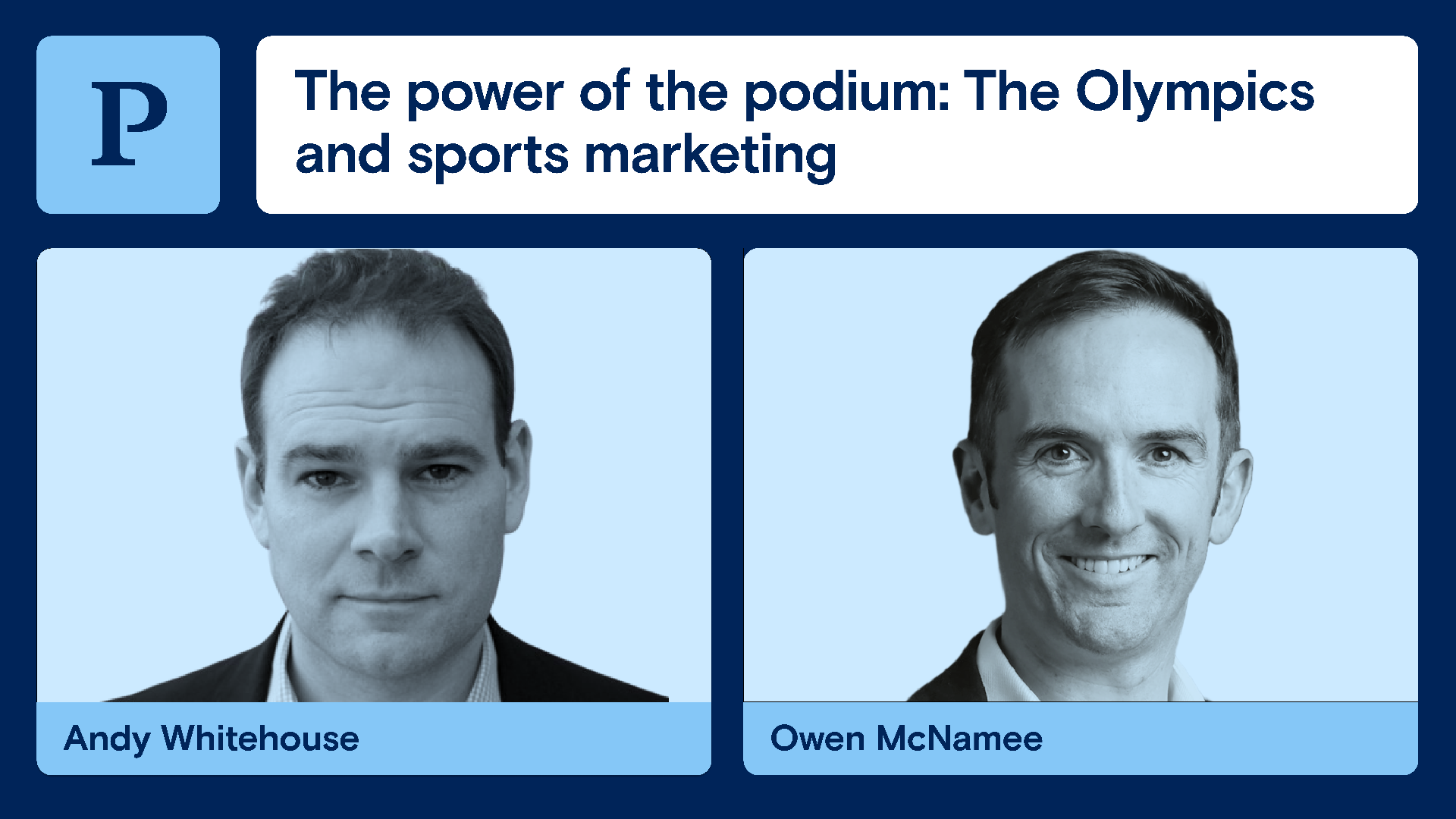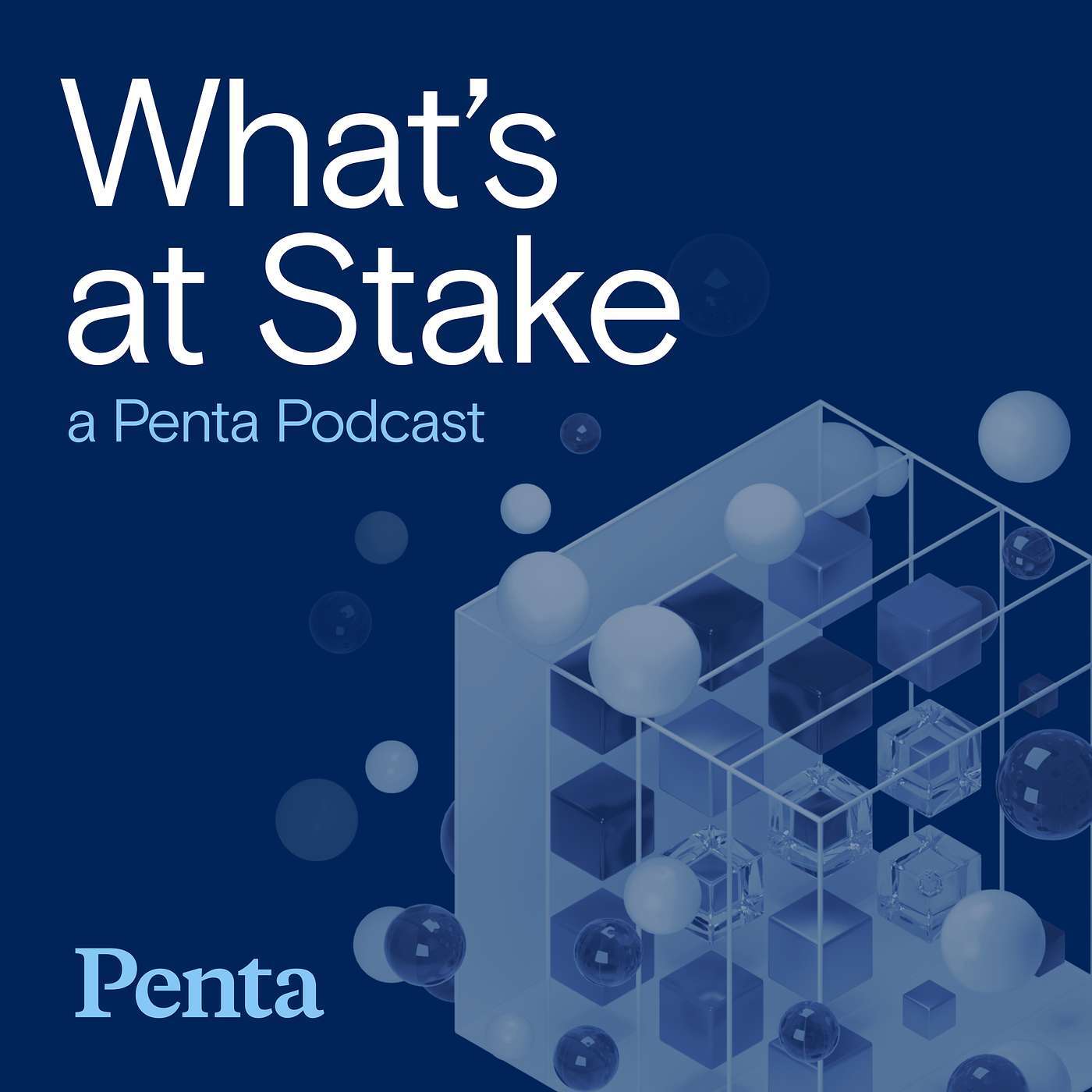The power of the podium: The Olympics and sports marketing

Authors

On this week's episode of What's at Stake, managing partner Andy Whitehouse talks to our director of marketing, Owen McNamee, about the complex strategies behind consumer branding and sponsorships at the Olympics.
Together, they look at the opportunities for brands and athletes to create harmonious partnerships while still working in their best interests. They also discuss how brands seek to reach their objectives while navigating within the tight parameters set by the International Olympic Committee.
Tune in for this compelling discussion as you cheer on your country and your favorite athletes on their quest for gold.
Podcast Transcript Summary:
Andy: 0:06
Hello everybody, and welcome to this week's episode of What's at Stake. I'm your host, Andy Whitehouse, coming to you from Penta's offices in New York City. I'm joined by Owen McNamee, Penta's Director of Marketing. Welcome to the podcast, Owen.
Owen: 0:13
Cheers, Andy. Delighted to be here.
Andy:
So, we're recording this on day three of the Paris 2024 Olympics. Today's episode focuses on how brands and companies use the games to capture the attention of billions of viewers worldwide. It's been an exciting start to the games already. As of day three, the top four spots on the medal table are dominated by Asia Pacific countries. Have you seen any of the games yet, Owen?
Owen: 0:53
I've watched the opening ceremony and been deeply invested in the fencing and a few other sports. There were moments during the four-hour opening ceremony where I wondered if I had made the wrong decisions in life, but ultimately I thought it was a success.
Andy: 1:14
I thought it was wonderful. Beyond the thrill of the competition, there's another race going on behind the scenes: a race among brands to capture the attention of billions of viewers. Today, we'll explore consumer branding at the Olympics and talk about elite sports, sponsorships, and branding more broadly. Thanks, Owen, for joining us.
Owen: 1:43
Thanks, Andy. It's strange, but it feels like coming full circle for me. Almost 15 years ago, I did an MBA specializing in sports marketing in Paris. It's fascinating to consider how brands try to capture consumers' attention during such a major event.
Andy: 2:19
You're the perfect person for today's conversation, Owen. Let's start with the basics. How do companies make their brands come to life in the context of the 2024 Olympics? How has this changed over time?
Owen: 2:37
The Olympics is unique because it operates on a four-year cycle. Sponsorships are complicated due to the various levels of rights holders, from the International Olympic Committee down to national governing bodies and individual athletes. Compared to something like the NFL, it's a much more complex and nuanced system. Over time, we've seen sponsorship evolve from basic endorsements, like Jesse Owens being handed a pair of runners by Adi Dassler, to today's Olympic Partnership Program, which can cost around $300 million for exclusive rights.
Andy: 4:18
Take us behind the scenes, Owen. For a brand manager or someone in a marketing role like yours, what goes into planning a sponsorship at the Olympics or a brand activation in Paris?
Owen: 4:37
The first thing to avoid is last-minute planning. Sponsorships need to be long-term projects, ideally spanning the four-year Olympic cycle. When a company decides to invest in sponsorship, they aim for a shared halo effect from the glory, enjoyment, and values of the sport. The brand's alignment with these values is crucial. Objectives must be clear, from activation around the sponsorship to evaluating its impact and making adjustments annually or biennially.
Owen: 6:33
There are moments when campaigns can blend into one another, especially global campaigns voiced differently depending on the market. Successful campaigns often stand out because they align well with local contexts. For instance, Channel 4's advertising of the Paralympic Games treated Paralympics on equal footing with the Olympics, which was both interesting and moving. It's essential to balance global appeal with local relevance.
Andy: 8:34
Great, thanks, Owen. Let's take a quick break. When we come back, we'll hear more about consumer branding and marketing at the Olympics and beyond.
Welcome back to What's at Stake. I'm Andy Whitehouse, here with Owen McNamee, talking about branding and sponsorship around the Olympics, the Paralympics, and elite sports in general. Before we discuss broader sponsorship topics, can you explain the distinction between supporting individual athletes versus team sponsorships?
Owen: 10:09
It's becoming more relevant now. Recently, Olympic athletes have been earning additional income through social media, like TikTok. A notable example outside the Olympics is Naomi Osaka, who refused interviews during tennis tournaments, highlighting the tension between traditional competition and individual branding. Most Olympic athletes, unlike high-paid sprinters or basketball players, live on subsistence grants. There's always a tension between different rights holders, making Olympic sponsorships more complex than other sports events.
Andy: 12:36
So, one thing we've seen with clients at Penta is the merging of sports with other sectors like entertainment and technology. How do you see this influencing how marketers and sponsors approach sports?
Owen: 13:26
The IOC ensures sponsors have exclusive visibility and protection against unauthorized branding. This control extends to digital formats, where the IOC can manage content releases and crack down on illegal broadcasts. However, it's essential to balance control with allowing fans to share and discuss content. Successful brands create their channels to manage this, like the NBA, F1, and Major League Baseball.
Andy: 15:59
What are the biggest challenges for brands sponsoring elite sports teams or individual athletes?
Owen: 16:19
The main challenge is ensuring authenticity. Sponsorship should reflect the sport's glory and enjoyment. If it feels artificial or mismatched, it can lead to poor outcomes. Brands must vet their sponsorships carefully to align values and avoid disasters, like a scandal involving an athlete. The key is showing authentic support rather than just labeling everything with the brand.
Andy: 18:36
There's a huge benefit to being associated with a successful athlete or team, but brands also have to give up some control. Do you agree?
Owen: 19:16
Yes, it's a balance. Having worked with rights holders, agents, NGBs, and brands, I've seen the temptation to tightly control sponsorships. However, overly controlling relationships can lead to resentment. It's essential to formalize expectations while allowing room for the athlete or team to feel valued and perform their sponsorship role authentically.
Andy: 20:20
It's striking how sports figures are expected to weigh in on various topics, including politics. How does this impact sponsors?
Owen: 21:08
Athletes often find themselves at the intersection of sports and politics. There have been famous moments, especially around the Olympics, where this line is blurred. For instance, Kylian Mbappe's stance against the hard right in France before the UEFA championships. Athletes taking such positions reflect the reality of the world we live in, even if it adds complexity for sponsors.
Andy: 22:06
The Olympics have long-term sponsorship relationships. How should brands think about long-term versus one-off sponsorships?
Owen: 23:13
Long-term sponsorships, ideally at least four to five years, are more effective in reflecting value for both parties. It's a significant investment but can pay off. For example, I still remember mid-90s Liverpool's Carlsberg sponsorship. Brands need to set measurable objectives and regularly evaluate their sponsorships. I'd like to see more grassroots investments that can make a massive impact rather than just obvious high-profile sponsorships.
Andy: 25:42
Before we wrap up, which three countries do you think will finish at the top of the medal table?
Owen: 25:53
The US is always a contender. France, as the host, might be in the top five. Team GB has raised their standards, and South Korea is strong in sports like fencing. My prediction would be the US, China, and possibly France or Great Britain in the top spots.
Andy: 26:46
Hosting the Olympics is monumental, but it often has a magical effect on the host nation's athletes. I'll keep an eye on France. Anyone from the Republic of Ireland we should watch?
Owen: 27:11
Ireland has a strong contingent this year, particularly in rowing and boxing. The 400-meter mixed relay team looks promising. It's one of the largest Irish contingents in a long time, so hopefully, there will be a few medals. We're a smaller nation hoping to box above our weight rather than dominate the top of the league tables.
Andy: 27:35
Thanks for the conversation today, Owen. It's been lots of fun. Thank you to our listeners for tuning in. Remember to like and subscribe to What's at Stake. I'm your host, Andy Whitehouse, coming to you from Penta's offices in New York. Thanks for listening, and we'll see you next time.